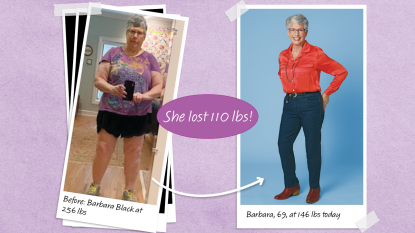Experts: Saying ‘Sorry’ Too Much Is Holding Women Back — Here’s What to Say Instead
You think you're 'just being nice,' but over-apologizing can surprisingly make others think less of you

If you’re constantly apologizing for mundane things like, “I’m sorry, I need to get by you” or “I’m sorry, I have a question” or “I’m sorry I can’t attend your party” you may be one of the millions of women stuck in a “I’m sorry” spiral. Research shows women apologize more often than men, and habitual over-apologizing can sap our self-confidence, dilute the impact of a real apology and even diminish our authority and credibility. So you may wonder, “Why do I always apologize?”
There are three main reasons women over-apologize, reveals psychotherapist Beverly Engel, LMFT. “One of the top causes is society telling us that women have to be ‘nice’ by staying small and silent and not ruffle feathers,” she says. But we can be nice and not overly apologetic at the same time.
The second trigger is perfectionism. “Women often say sorry when we’re being overly critical of ourselves,” Engel adds. “Think back to your life: Were you told you must do everything right or you weren’t worthy? Once you discern where this voice is coming from, you can show yourself compassion by saying, ‘I’m doing my best; I’m only human.’”
The third and perhaps most challenging cause of over-apologizing is trauma. Engel explains that in response to fear, we either go into fight, flight, freeze or fawn. “Fawn is the newest research-proven reaction — it means that we learn to look and act like we’re not a ‘threat’ by putting our head down and saying we’re ‘sorry.’ If you had a traumatic childhood, you probably learned to ‘fawn’ to protect yourself.”
No matter the trigger, here are more expert ways to stop over-apologizing and help you stand up for your needs and boost your self esteem.
Listen to what your friends say when you apologize
Often saying “I’m sorry” is so instinctive and automatic, you may not even know you’re doing it. “It’s difficult to be aware of it ourselves, which is why it’s helpful to look for and be more conscious of the responses we’re getting from friends or coworkers,” says Engle, who is the author of 22 self-help books including, The Nice Girl Syndrome and It Wasn’t Your Fault: Freeing Yourself from the Shame of Childhood Abuse with the Power of Self-Compassion. “Instead of brushing off remarks like, ‘No need to apologize,’ or ‘It’s okay, you’re not bothering me,’ think of those kinds of responses as a signal that you’re saying ‘sorry’ too often.”
Related: How to Get Along With Your Adult Children: 6 Expert Tips That Will Boost Your Bond
While we may believe apologizing shows that we’re polite, Engel says overdoing it can make people question our sincerity. Just becoming more aware of the messages people are sending us can help us look within ourselves to find hidden triggers behind our “sorry” responses.

Pinpoint how the apology makes you feel
Taking a moment to focus on how a genuine vs. a kneejerk apology makes you feel can help you outsmart the latter impulse, says sociologist Maja Jovanovic, PhD, author of Hey Ladies, Stop Apologizing…and Other Career Mistakes Women Make. “Women tell me a genuine apology doesn’t diminish them — they may feel bad about what they did, but they’re taking accountability and the true apology offers closure.”
But when she asks women how they feel when they offer an unnecessary apology such as, “I’m sorry to disagree” or “I’m sorry to bother you” they have a very different reaction: “They often say they feel ‘silly,’ ‘deflated,’ or ‘stupid.’” While it may be uncomfortable to admit such feelings, taking a moment to check in with yourself is key to catching yourself in the moment and changing how you respond.
Swap “I’m sorry” for these power words
Simply choosing a couple of simple phrases you can use in place of “I’m sorry” will help you stop apologizing unnecessarily, says Jovanovic. “Try to insert ‘excuse me’ or ‘thank you.’ For example, rather than say, ‘I’m sorry, I can’t hear you,’ try, ‘Excuse me, I didn’t catch what you said — can you please repeat that?’ Or rather than apologize to a friend for venting about your stressful day, you might say, ‘Thank you for listening, it is really helpful.’”
She adds that the power of “thank you” can’t be underestimated, recounting an anecdote of a woman trying to kick the “sorry habit,” who instead of apologizing for being a few minutes late to a meeting, just said, “Thank you for waiting — let’s get down to business.” This simple turn of phrase signals a readiness to problem-solve, which makes people respect you more.

Tap into a solution mindset
“When I ask women what they most want to hear when someone has aggrieved them, getting an apology is often way down on the list,” reveals Jovanovic. What would they rather hear? “They want people to acknowledge the harm or hurt feelings they caused and offer an explanation of why they did it. This shows genuine remorse and requires more self-reflection than a simple ‘I’m sorry.’” (Click through for tips on how to apologize to someone you’ve hurt)
In other words, as you determine when an apology is necessary, keep in mind that people often want to hear something that goes a bit deeper — and that will ultimately strengthen your relationship.
Own your apologies
The ultimate goal is not to eliminate “I’m sorry” from your vocabulary but to be mindful of the impression you’re making to others and to yourself. “Don’t be afraid to say, ‘I’m sorry,’ when you actually did something wrong,” says Deborah F. Tannen, PhD, professor of linguistics at Georgeotwn University and author of, That’s Not What I Meant!: How Conversational Style Makes or Breaks Relationships.
“All words have social meaning and saying you’re sorry can convey that you’re taking someone’s feelings into account,” Tannen explains. “But if you committed a ‘misdemeanor,’ don’t treat it like a ‘felony’. Keep your apology brief.” In the end, it takes practice to find that balance, and you will get there one step at a time and feel more confident, empowered and respected.
Want more on mental health? Check out these stories:
Bad Day? Psychologists Reveal 10 Simple Ways To Bounce Back from a Setback
Embrace JOMO — The Joy of Missing Out — to Take Your Happiness to The Next Level













